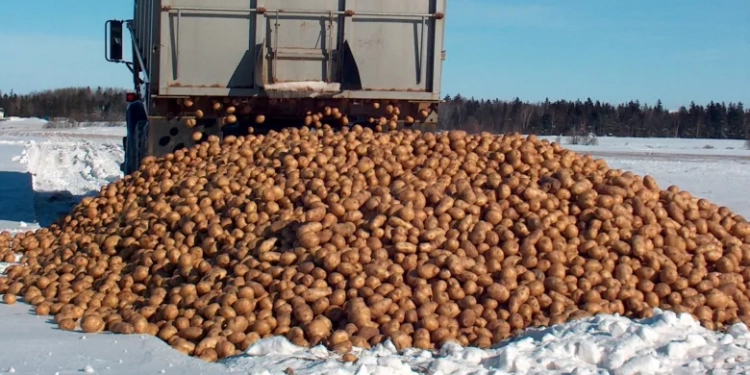Canada suspended P.E.I. potato exports to the U.S. last fall after fungus was detected in 2 fields
Canadian and U.S. officials are scheduled to meet this week to see if progress can be made to end a dispute that resulted in Canada suspending all shipments of potatoes from Prince Edward Island to the United States. Officials from the Canadian Food Inspection Agency (CFIA) will have a virtual conversation with their U.S. counterparts from the Animal and Plant Health Inspection Service (APHIS) on Wednesday.
According to a statement from CFIA, officials plan to discuss “a path forward towards the resumption of trade of P.E.I. fresh potatoes.” Canada suspended the shipment of P.E.I. potatoes to its largest export market after the potato wart fungus was detected in two fields late last year. Ottawa has argued the self-imposed ban was necessary, as it feared the U.S. would enforce a ban of its own, which would be more difficult to lift in the long run.

The decision infuriated P.E.I.’s Premier Dennis King and many potato farmers. The fungus was detected in two P.E.I. fields where the potatoes grown were intended for processing in Canada, not export to the U.S.
Puerto Rico is major market
The CFIA statement says the focus of the meeting will be a national survey it conducted in the fall of 2021 of potato fields in Canada following the discovery of the wart fungus. “Soil samples were collected and tested from across Canada, including 178 samples from non-regulated seed potato fields in P.E.I. No potato wart was detected in any of the samples,” the statement said.
That survey is separate from investigations also being conducted by the CFIA after inspectors found potato wart in two P.E.I. fields. The Canada-wide survey provides some additional information about the spread of potato wart in Canada, the CFIA statement said. The Puerto Rico export market is also expected to come up in this meeting, amid a push by both P.E.I. and Puerto Rican importers to have exports to the U.S. territory resume immediately. Potatoes are not grown in Puerto Rico, meaning the potato wart fungus does not pose any sort of risk to crops.
Roughly 25 per cent of P.E.I.’s potato exports to the U.S. end up in Puerto Rico. “The CFIA will raise the shipment of P.E.I. potatoes to Puerto Rico at this meeting and will continue to treat this issue as a priority until those exports resume,” the statement said. Canadian officials are promising to provide an update to farmers through the P.E.I. Potato Board once the meeting is over.

- Billy Cameron grows seed and table potatoes on the family farm in Hampton, P.E.I., and is vice-chair of the P.E.I. Potato Board.
- “Customers have started looking for options. No question, and that is completely understandable. The situation we’ve been put in, we don’t have a timeline. There’s no hard dates on this,” Cameron said.
- “Completely understandable of the customers looking for new seeds. They need to continue their businesses and move along.”








